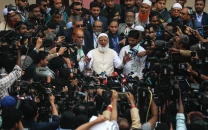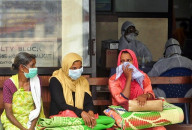Chinese official demoted for not smoking in front of Muslims
A notice from the government accused the official of 'being afraid to smoke before religious figures'

Muslims eat meals as they break fast on the first day of the holy fasting month of Ramadan at the Niujie Mosque in Beijing. PHOTO: REUTERS
Xinjiang, home to China's Muslim Uighur ethnic minority, restricts religious practises -- such as growing beards, wearing headscarves, and fasting during Ramazan -- that are seen as symbols of "Islamic extremism".
A notice from the Hotan district government over the weekend accused Jelil Matniyaz, a village-level secretary for the ruling Communist party in the far-western region, of being afraid to smoke before religious figures.
"His behaviour of 'not daring' to smoke conforms with extreme religious thought in Xinjiang," a local official told the Global Times newspaper.
Dalai Lama visits disputed monastery, angering China
He added that a dutiful party member would choose to smoke in front of religious believers in order to demonstrate his or her commitment to secularism.
Matniyaz's failure to do so meant that instead of "leading the fight against extreme religious thought," he was "failing to confront the threat of extreme regional forces", the official said.
Matniyaz was given a "stern warning", stripped of his party secretary duties and downgraded from senior staff member to staff member.
Xinjiang has been racked for years by a series of violent attacks which Beijing blames on exiled Uighur separatist groups whom it says are aligned with foreign terrorist networks.
China restricts Ramazan fasting in Muslim region
Rights groups have countered that unrest in the region is largely a response to repressive policies, and that tighter measures are counterproductive.
Uighurs, a traditionally Muslim group, complain of cultural and religious repression and discrimination.
China introduced new anti-extremism legislation in Xinjiang late March, including a provision that bans "abnormal" beards.



















COMMENTS
Comments are moderated and generally will be posted if they are on-topic and not abusive.
For more information, please see our Comments FAQ